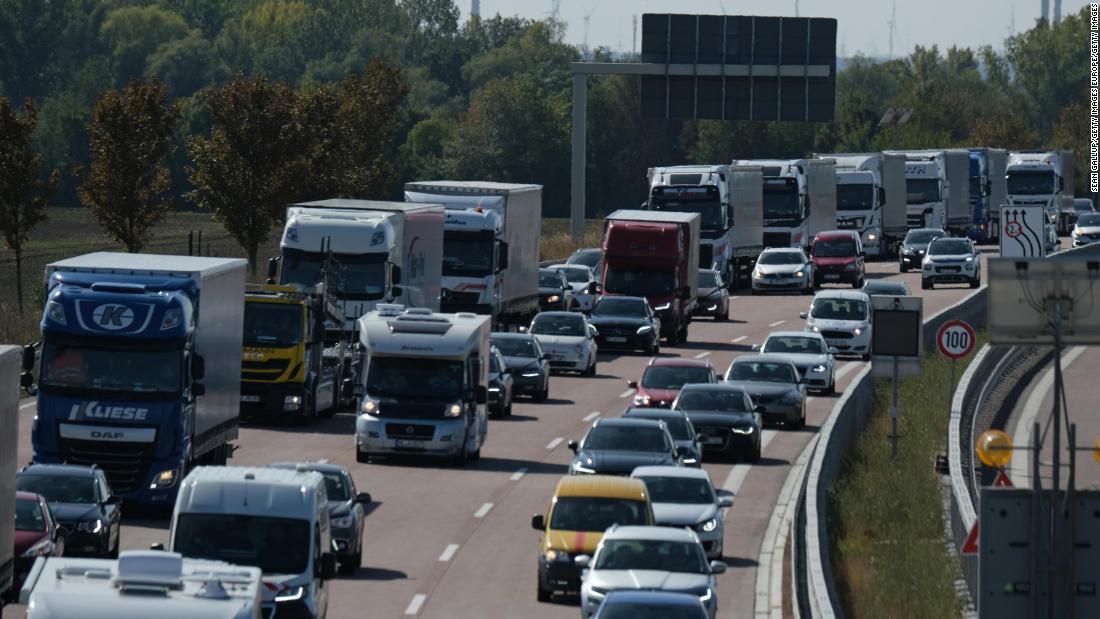
The United States can begin to take the biggest single step of any nation in the fight against climate change. The President must set tough rules that restore, and later strengthen, tailpipe emissions standards that President Donald Trump trashed while putting us on course to phase in a new car fleet that is 100% electric by 2030.
Biden's actions will shape US greenhouse gas levels -- and what we drive -- for generations and send a message to the world that we are serious about fighting what he has called the "existential threat" of global warming.
Every gallon of gasoline we burn, whether in a hybrid vehicle or a Hummer, emits 25 pounds of carbon dioxide, the heat-trapping gas that is most responsible for warming the planet. Transportation spews more of that primary global warming pollutant than even power plants.
So, we can't tame climate change without aggressively reining in gas-guzzling and emissions from SUVs, pickups, minivans and cars.
Nine years ago, automakers and President Barack Obama reached a deal to make 5% annual improvements in gas mileage and emissions. Automakers added cost-effective efficiency technology they had sitting on their shelves, such as improved engines, transmissions and aerodynamics, to make their vehicles guzzle and pollute less. Fully enforced, by 2025, the standards would have delivered a new car fleet averaging 36 miles per gallon, compared to 24.9 mpg today. Furthermore, those standards would have kept six billion tons of CO2 out of the atmosphere while saving consumers $1 trillion on gas.
But in 2017, four days after Trump took office, auto company CEOs returned to the White House, asking to roll back the very rules they had negotiated with his predecessor. Trump complied, effectively freezing mileage and emissions at 2020 levels for the next six years -- and saddling the country with a fleet averaging no better than 29 mpg, costing consumers more at the pump. As a first step, with his upcoming decisions, President Biden must reinstate the Obama-era standards.
Manufacturers are taking advantage of Trump's rollback. They are rolling out prodigious numbers of gas-guzzling SUVs and other light trucks and slapping on monster markups -- for as much as $30,000 and more on some. Most of these trucks haul little more than a latte from Starbucks. Some automakers assert that they may plow some of these hefty profits into making EVs. But so far most carmakers have produced many promises but only a relative handful of EVs compared to the 17 million gas-powered cars, pickups and SUVs they churn out annually.
Notwithstanding their big talk about an electric future, automakers are devoting a huge share of their roughly $14 billion annual marketing budget to pushing the gas-guzzling trucks on consumers. Ford sold barely 11,000 EVs in the 12 months ending in April -- and 800,000 gas-powered F-150 pickups in 2020. Yet the company asserts it anticipates its 2030 global production will be 40% electric.
With its track record, the new electric F-150 it has dubbed "the Lightning" may be more Tinkerbell than Thor. General Motors' declaration that it "aspires to eliminate tailpipe emissions" by 2035 and go carbon neutral by 2040 is a far cry from pledging to halt production of gas-engine vehicles. We won't build back better banking on automakers' hopes.
Last summer, the California Air Resources Board completed a feeble agreement with Ford, Honda, Volkswagen, BMW and Volvo that Dave Cooke, a Union of Concerned Scientists senior vehicles analyst, told us would cut emissions by only half what the Obama rules would have saved. Automakers seized on it as a model for the rest of the country.
Don't be bamboozled. Applied nationally to all automakers, the mileage and pollution savings would be so slight that they would extend Trump's climate reach through most of Biden's term.
Dressing up those loophole-riddled Swiss cheese rules as a revived Obama plan would leave Biden far from his central -- and crucial -- climate goal: Bringing carbon dioxide emissions to near zero by 2050.
We won't fend off climate catastrophe with anything less than bold steps. We have no choice but to phase out internal combustion engines in new vehicles, and the pollution they emit, by 2030.
Just do the math: Many SUVs and other light trucks and cars sold in 2030 will last 20 years. They will still be rolling in 2050. Carbon dioxide persists for hundreds of years. So, with the invisible, ubiquitous tenacity of Lewis Carrol's Cheshire cat, the pollution will foul our atmosphere -- and overheat the globe -- far into the 22nd century.
Cutting emissions and boosting gas mileage by 7% a year -- two percentage points more than the companies agreed to a decade ago -- will ensure that the tens of millions of gas-powered vehicles built between now and 2030 won't bar us from protecting the climate.
This is auto mechanics, not rocket science. Nearly a decade ago, automakers started to meet Obama's 5% yearly improvements by using more efficient transmissions; safe, lightweight, high-strength steel and aluminum, and aerodynamic designs. If they fully deploy these and other efficiency technologies in all their vehicles, they can achieve the imperative 7% gains while phasing in EVs. Here's a bonus: the technology will save more than it costs.
If Biden takes bold action now -- boosting gas mileage, scrapping loopholes, and plugging in -- he can make history as the president who tackled the growing climate crisis. Global warming's challenge demands no less.
"auto" - Google News
August 02, 2021 at 05:57AM
https://ift.tt/3fkvfDg
Curbing climate change is auto mechanics, not rocket science - CNN
"auto" - Google News
https://ift.tt/2Xb9Q5a
https://ift.tt/2SvsFPt
Bagikan Berita Ini














0 Response to "Curbing climate change is auto mechanics, not rocket science - CNN"
Post a Comment